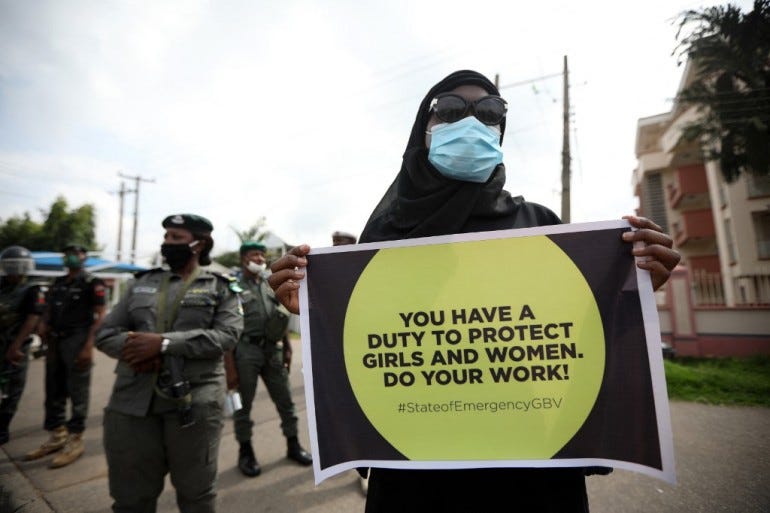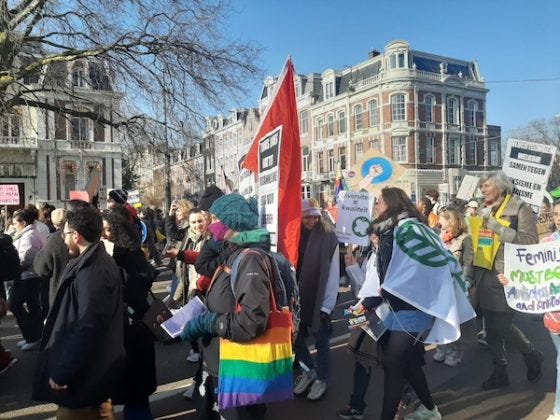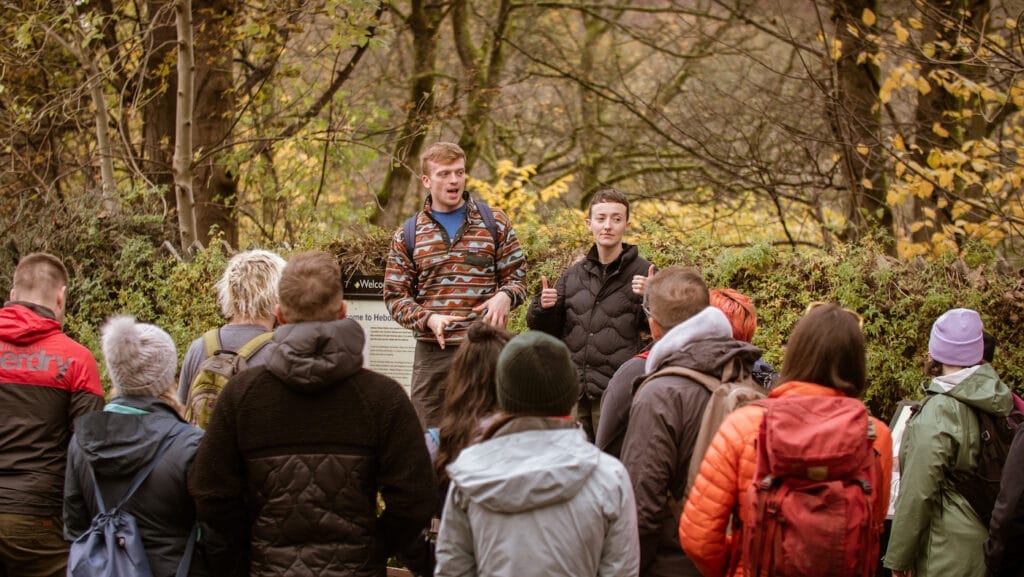Global Roundup: Women in Nigeria Protest, Netherlands’ Women’s March, Sri Lanka Women Surfers, Middle East Police Target LGBTQ+ Phones, Queer Hikers vs Heteronormative Macho Norms
Curated by FG contributor Samiha Hossain
A protester wearing face mask, carries a banner outside the Nigerian Police Headquarters in Abuja, Nigeria, during a demonstration to raise awareness about sexual violence in Nigeria on June 5, 2020 [File: Kola Sulaimon/AFP] via Al Jazeera
Hundreds of women in Nigeria took to the National Assembly Complex in the country’s capital Abuja to protest against the Senate’s decision to vote against the adoption of five gender bills as part of the amendment of the 1999 constitution. Women barricaded the entrance of the Nigerian National Assembly, holding up posters and banners and singing songs. The protesters, including market women, civil servants and various professionals, prevented lawmakers from entering their offices last week.
I am here [at the protest] because I am angry. When I saw the vote yesterday, the first thing that came to my mind is why do they hate us so much? They are literally saying we are second-class citizens. - Nimisire Emitomo, 25-year-old writer
After two years of deliberations, the legislature had voted on a series of bills to amend the controversial 1999 constitution, adopted during the transition from military rule to democracy that year. One of the amendments, if passed, would have granted citizenship to foreign-born husbands of Nigerian women; the Nigerian constitution already confers automatic citizenship on foreign-born wives of Nigerian men. Another would have given a woman the right to become indigenes of her husband’s state after five years of marriage. There were also provisions to assign 35% of legislative seats to women, as well as reserve 35% of political party leadership for women.
Activists have been holding consultations on the bills with legislators, civil society groups and various other stakeholders for months. Protesters say the rejections have made all the efforts futile and pushed back years of work.
They shut the bills down with a vehemence that actually scares us. The reason why women are out today and tomorrow and keep having this conversation is because women are not just good only for votes. You cannot lead us without us. - Chioma Agwuegbo, executive director of TechHerNG
Women's representation in Nigeria's parliament, at around 4%, is among the lowest in the world. Moreover, no woman has ever been elected governor or president and only a handful of cabinet appointments are handed to women. Activists say patriarchy and cultural biases are some factors influencing women's low participation in government.
It is clear that [the rejection of the bills] is a continuation of patriarchal structure in the society. As diverse as Nigeria is, in terms of how divided we seem to be when it comes to ethnic, religious and class divides, one thing that unites Nigerians more than anything is the common hatred for women. - Ayisha Osori, director of Open Society Foundations
Photo: Chloe Lovatt via DutchNews.nl
Nearly 1,000 people participated in Saturday’s Women’s March in Amsterdam, Netherlands, ahead of the International Women’s Day celebrations this week. The theme of this year’s March was “Time is Up.” Organizers stressed that women’s safety and self-determination are not being taken seriously in the Netherlands.
I think it’s important to make sure women are safe outside. I don’t want to be afraid to walk on my own at night. I think it’s insane that in 2022 we still don’t have equal rights between men and women. We need to make men accountable for what they do. - Gabi, 26
In addition to activist groups’ banners, there were also political party banners present at the march, with local elections nearing. Some people also used the demonstrations as a stark reminder of current world events. Rozenia Salihu took the stage to dedicate a spoken word performance to those who have had to flee global conflicts. People held signs which read “Stand for Ukrainian women,” while the colours of the Ukrainian flag were dotted amongst the protesters. Ayella, 45, originally from Palestine, was one of many waving the Palestinian flag.
I hope everyone is taking note of what is happening in the news and the double standard. How sanctions for certain countries were not possible, are now all of a sudden, possible… I am a feminist and an anti-colonialist feminist, and an anti-capitalist feminist. I always bring a sign that reminds people of the connection between feminism and anti-colonialism – a lot of people don’t think about it. - Ayella
Despite the more serious undertones marking the event, there was also an upbeat mood. The back of the march was flanked by drummers, encouraging people to dance or run towards the park.
Still, attendees insisted on their important message that there is still a long way to go when it comes to gender equality, with reports of domestic violence skyrocketing in the Amsterdam region since November 2021.
Every week a woman is killed because she is a woman. I don’t need equal rights, I just need to be able to walk around this world on my own terms. – Roalind, 57
Shamali Sanjaya (centre) with members of the Arugam Bay Girls Surf Club. Photograph: Max Gifted via The Guardian
Shamali Sanjaya, a 34-year-old mother of two and with another baby on the way, is at the forefront of a quiet female surfing revolution that has swept Sri Lanka. In 2018, she helped set up Sri Lanka’s first all-female surf club in Arugam Bay and in 2020 competed in Sri Lanka’s first women-only category in a national surfing competition. At four months pregnant, she’s still hitting the waves several times a week, and plans to compete again after her baby is born.
In Sri Lanka’s conservative society, it is generally only men or women tourists who are able to surf. In 2011 Sanjaya’s neighbour, Tiffany Carothers, who had just moved from her native California, invited her to come surf. Once Sanjaya had a taste for the waves, she could not be stopped.
When I surf, it is such a happy feeling for me. I am filled with this energy, I feel so strong. Life is full of all these headaches and problems, but as soon as I get into the water, I forget about it all. - Shamali Sanjaya
Sanjaya faced fierce disapproval from her brother who believed her place was inside the home. However, being headstrong, she decided to ignore him and would instead coordinate secret surf rendezvous, rushing to the beach at lunchtimes when her brother was eating or going out at the crack of dawn.
In 2015, Carothers decided to set up an event to teach more local girls in Arugam Bay how to surf. She and Sanjaya went house to house, talking to women and their families to persuade them to come along. Initially many parents were reluctant, fearful about safety and that surfing meant partying, drugs and alcohol, or that, in a society that still subscribes to anti-Black and colourist racist views that equate beauty with light skin, being out in the sun would darken their daughters’ skin. The first event proved so popular that they decided to make it a weekly gathering.
As gossip and local disapproval spread, the local tourist board intervened and threatened to kick Carothers and her family out of the country if they saw her trying to teach surf lessons to girls. The police also started questioning the members, causing over half the girls to stop attending. But rather than stopping altogether, the remaining women took their club underground and would meet secretly on the beach and go on clandestine surf trips to other parts of the island.
Finally in 2017, after the Surfing Federation of Sri Lanka was set up, there was a pathway for their own official surf club and in August 2018 Arugam Bay Girls Surf Club was born. They now have about a dozen core members, ranging from ages 13 to 43.
Though they have broken through many of the local taboos, many of the women still face a backlash from their families and communities. Nandini Kaneshlingam, a 43-year-old mother of four whose husband killed himself in 2011, said she suffered so much stigma over being a mother and widow in her 40s on a surfboard that she almost quit the club several times.
It was my children who came and pushed me on to waves. After my husband died I was very sad and things were very difficult, but with surfing, it made me feel happy again. - Nandini Kaneshlingam
Ammu Anadarasa, 14, one of the club’s youngest members, said she had been mercilessly teased at school.
My friends at school used to fight with me about it, they’d say ‘Why are you doing surfing?’ and call me a boy…Now they know I am a good surfer. I just wish more girls would do surfing. - Ammu Anadarasa
Despite the challenges, many women and girls are excelling at surfing and conquering their fears. The surf club will certainly go a long way in breaking down patriarchal traditions of women staying in the home and show young girls that they can pursue their passion.
Authorities used the presence of certain apps, pictures deemed "effeminate," and even innocuous conversations to prosecute people under a hybrid of anti-LGBTQ+ and cybercrime laws, according to researcher Afsaneh Rigot’s 130-page report. Police in Egypt used sting operations to entrap people via dating apps, while authorities in Tunisia and Lebanon tacked on extra charges after searching detainees' phones.
In order to survive, queer people are being forced to erase and hide key elements of themselves from the internet. - Afsaneh Rigot
Omar, 19, in Egypt said he lives a double life. He never discusses being gay on WhatsApp, uses fake names on all dating apps, would never meet an online romantic interest in person and avoids neighbourhoods where police may set up checkpoints. He also uninstalls WhatsApp, Facebook and Grindr on his phone every morning before leaving his home.
I have to live like a spy. Almost nobody knows who I really am. - Omar
With Tunisia in political upheaval, Lebanon in financial meltdown and Egypt broadly restricting civic freedoms, advocates in each country said comprehensive legal reform was unlikely. Instead, LGBTQ+ organisations and lawyers are advising communities to regularly wipe their devices, offering tips on digital security, and winning cases on technicalities.
I tell my clients, 'leave nothing on your phone - always presume the phone will be confiscated.’ - Youmna Makhlouf, has defended LGBTQ+ people in court in Lebanon
The report also said there was "corporate complicity in the prosecution of LGBTQ people in Egypt, Lebanon, and Tunisia” - meaning the apps shared some responsibility too. Some companies have taken action to make the apps more secure and discreet for the LGBTQ+ community, but more needs to be done.
Most of the apps we are using are not designed for queer people in a high-risk environment…This forces queer people to become digital security specialists on their own. - Ramy Raoof, Egyptian privacy expert
Online spaces have been important places for LGBTQ+ people to connect and find community and support. With the rise of surveillance and hate speech as well as police targeting LGBTQ+ people’s phones in the Middle East, queer people are getting pushed out of vital spaces and becoming isolated.
Ailish Breen (R) founded Queer Out Here via Pink News
Ailish Breen had personal reasons for setting up Queer Out Here. They grew up in the Yorkshire countryside where a love for the outdoors was practically mandatory. After university, and a period in which they stopped exploring the outdoors, Breen rediscovered it and found how beneficial it was for their mental health and wellbeing. But they were also keen to challenge what they see as a lack of equality around access to the outdoors.
I think a lot of people do feel that the outdoors is only for certain types of people. People think it’s for middle class, white, heteronormative families, or there’s the really outdoorsy people who’ve got all of the gear, which can be really expensive. - Ailish Breen
Breen also wanted to challenge the macho, heteronormative ideas about the outdoors, which they say can be alienating for queer people. Breen was thinking specifically about the trans and non-binary community when they set up Queer Out Here.
So much of the horrible narrative, not just around trans people but queer people in general, is that there’s something unnatural about us. I just wanted to see what the power of being in nature and realizing that you’re part of nature would be. - Ailish Breen
Another factor for setting up Queer Out Here was that once Breen gave up drinking, they realized there was a lack of queer spaces outside of bars. The lack of LGBT+ spaces that aren’t alcohol-centric is particularly problematic for those recovering from addiction. Breen is now hoping to expand on their work with Queer Out Here by providing training to other outdoor groups and organizations.
I’d really like to help other organizations become more queer inclusive so that ripple effect can happen across the outdoor industry. I’d like to see the wider industry start to think a little bit more about how they can be more diverse and make the outdoors more accessible to different communities. - Ailish Breen
Samiha Hossain (she/her) is a student at the University of Ottawa. She has experience working with survivors of sexual violence in her community, as well as conducting research on gender-based violence. A lot of her time is spent learning about and critically engaging with intersectional feminism, transformative justice and disability justice.
Samiha firmly believes in the power of connecting with people and listening to their stories to create solidarity and heal as a community. She refuses to let anyone thwart her imagination when it comes to envisioning a radically different future full of care webs, nurturance and collective liberation.







